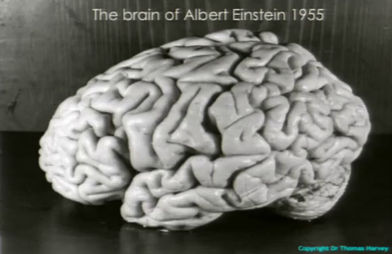Pathologist Thomas Harvey stole Albert Einstein’s brain after his autopsy in 1955. After that, he began a halfway between truculence and scientific curiosity, many wanted to know the secret of his genius, while others did not see this usurpation with a good eye. the results of the analysis were very revealing.
The truth is that few accounts of our historical scientific fabric are so disturbing and fascinating. There is some tragicity in this story, no doubt, but it also illustrates the singular desire of the human being to know himself. It’s funny to know what the pros and cons lurk in these brains are capable of changing the world in certain ways, powerful to make us discover exceptional things.
“Every day we know more and understand less. -Albert Einstein-
The father of relativity was one of them, but Albert Einstein was also something else: an icon, a media figure with strong social impact, knew it and gave very specific advice on what he wanted for him after his death. Intimacy. He wanted to be cremated and his ashes scattered in a river, after all this, his death could be announced to the media.
However, something failed. No one had an unpredictable and almost unimaginable factor: Thomas Harvey. This pathologist took albert Einstein’s brain after his autopsy and happened what the charismatic physicist never wanted: it became a revered relic.
In this story, chance and opportunity mix. Einstein died at the age of 76 on April 18, 1955, following the rupture of an abdominal aortic aneurysm; a few days later, a cremation was performed when the family expected to see Albert Einstein. death published in the media, they were surprised to read something very different. The New York Times reported that the nuclear physicist’s brain had been extracted from the body for study.
The head of all this was a pathologist, Dr. Thomas Harvey, who is said to have been a great admirer of Einstein. Moreover, his personality ranges from imbalance, the most indescribable introversion and the obsessive meticulousness of science. Certainly, being responsible for Einstein’s autopsy was an opportunity for him, an opportunity he did not waste.
He carefully extracted Albert Einstein’s brain, seeded it, dissected it and placed it in several vials, then placed them safely in the basement of his home, was not a neurologist, so his goal was as simple as he was ambitious. I wanted to bring together the best specialists in the world to study in detail every area of this brain, every fragment, every cell, with the aim of publishing the results as quickly as possible in the most prestigious journals and gaining worldwide fame.
However, all of Dr. Harvey’s concerns and aspirations have been thwarted. The first thing that happened was obvious: he lost his job. He was severely criticized and punished by the scientific community. His promising princeton career collapsed and his wife abandoned him. His action and the terrifying fact of having a brain hidden in a basement didn’t seem logical.
However curious, the only incentive he had to continue his business came from Einstein’s son Hans Albert, so, although he initially felt affected and outraged, he then concluded with something he thought had his logic. He advocated scientific progress.
If the analysis of this brain was of any use to the scientific community, the family gave its approval. Thomas Harvey’s work could continue.
The results of Albert Einstein’s analysis were published between 1975 and today. After Hans Albert’s permission, Harvey’s landscape changed, he was inundated with calls, interviews and even celebrities. Journalists camped in his garden. The journal Science contacted him, as did the best neuroanatomists in the world.
The 240 blocks and 12 series of 200 slides created by Harvey dividing Albert Einstein’s brain have begun to bear fruit.
The first thing that caught the attention of Albert Einstein’s brain was his size, smaller than normal.
As impressive as this data may seem to us, there is one aspect we cannot ignore. As Terence Hines, a renowned neurologist, pointed out, many began their work with the idea that they were analyzing the brains of a “genius. “Everyone struggled to see what exceptional features existed in Albert Einstein’s brain.
Now, as Dr. Hines points out, every brain shows something exceptional, that organ is the result of our life, of what we do, something as simple as playing an instrument or having creative work reorganizes each area of the brain in a particular way.
So, if something characterizes the father of relativity, it’s his versatility: besides being a physics genius, he spoke several languages, played different instruments, and, as many suspect, he might even have Asperger’s syndrome. Unique brain, small, but sophisticated and highly specialized.
However, the interest of the scientific community lies in the analysis of its DNA, veneration and experimental envy for Einstein’s remains seem to have no end.

